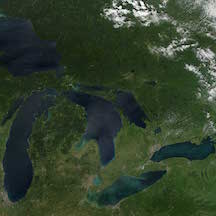Women Scientists Survey the Extent of Plastic Pollution in the Great Lakes
Posted on Aug 24, 2016 | Comments 0
 Women scientists from the United States and Canada recently embarked on a mission on the five Great Lakes to assess the amount of plastic debris pollution exists in the lake system and to raise awareness of the problem. The effort also hopes to inspire young women to pursue education and careers in science and engineering.
Women scientists from the United States and Canada recently embarked on a mission on the five Great Lakes to assess the amount of plastic debris pollution exists in the lake system and to raise awareness of the problem. The effort also hopes to inspire young women to pursue education and careers in science and engineering.
Organizers of the event say that eXXpedition Great Lakes 2016 is the largest simultaneous sampling of aquatic plastic debris in history. Seven research vessels with all-women crews participated in the effort. Previous studies have shown that there are plastics in the stomachs of 25 percent of some fish species in the Great Lakes.
 Melissa Duhaime, a research scientist in the department of ecology and evolutionary biology at the University of Michigan, was involved in the effort. She states that “in a single day through an event like this, we can potentially reach orders of magnitude more people than we do when we publish our scientific papers, which are read mainly by other scientists. And greater public awareness about this topic, rooted in rigorously collected and interpreted data, can certainly lead to changed behavior in our relationships with plastics.”
Melissa Duhaime, a research scientist in the department of ecology and evolutionary biology at the University of Michigan, was involved in the effort. She states that “in a single day through an event like this, we can potentially reach orders of magnitude more people than we do when we publish our scientific papers, which are read mainly by other scientists. And greater public awareness about this topic, rooted in rigorously collected and interpreted data, can certainly lead to changed behavior in our relationships with plastics.”
Dr. Duhaime is a graduate of Cornell University in Ithaca, New York, where she majored in biology. She holds a master’s degree and a Ph.D. from the Max Planck Institute for Marine Microbiology in Bremen, Germany.
Filed Under: Research/Study • STEM Fields








